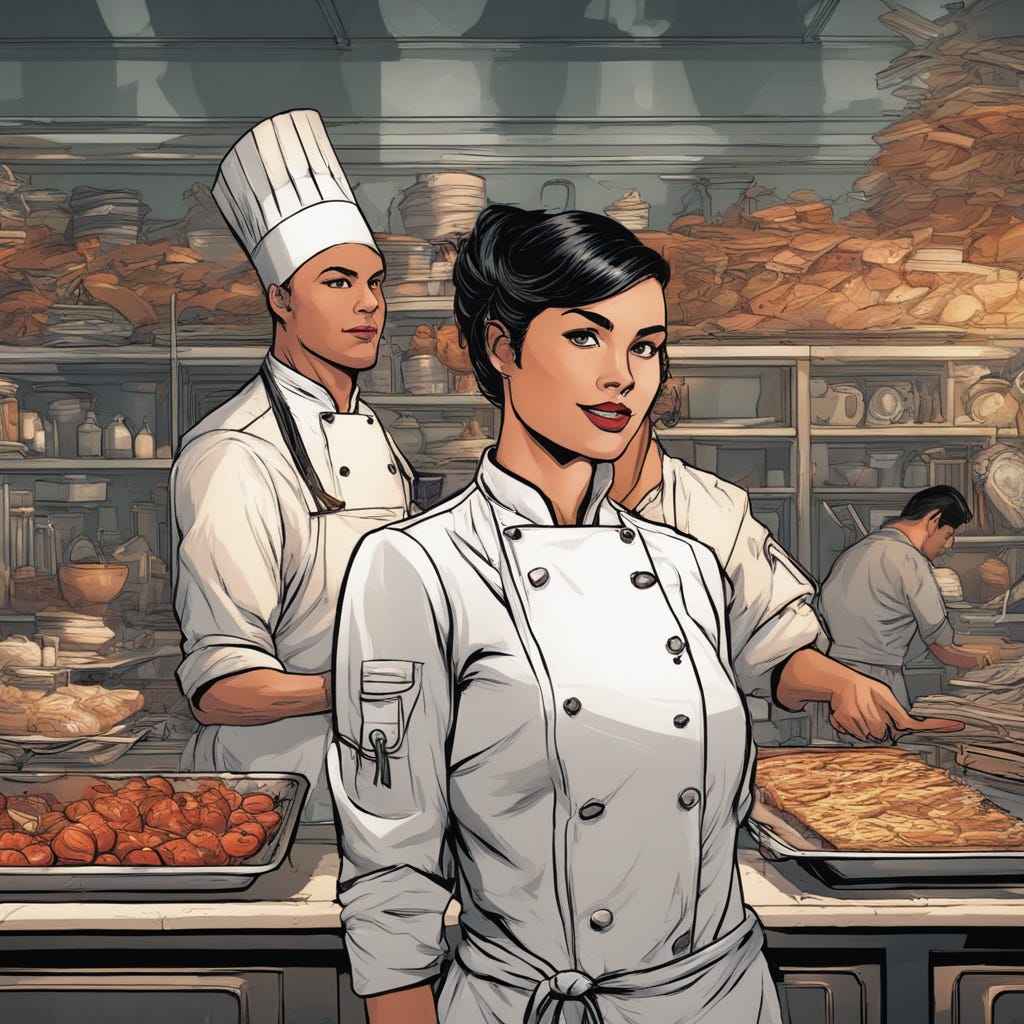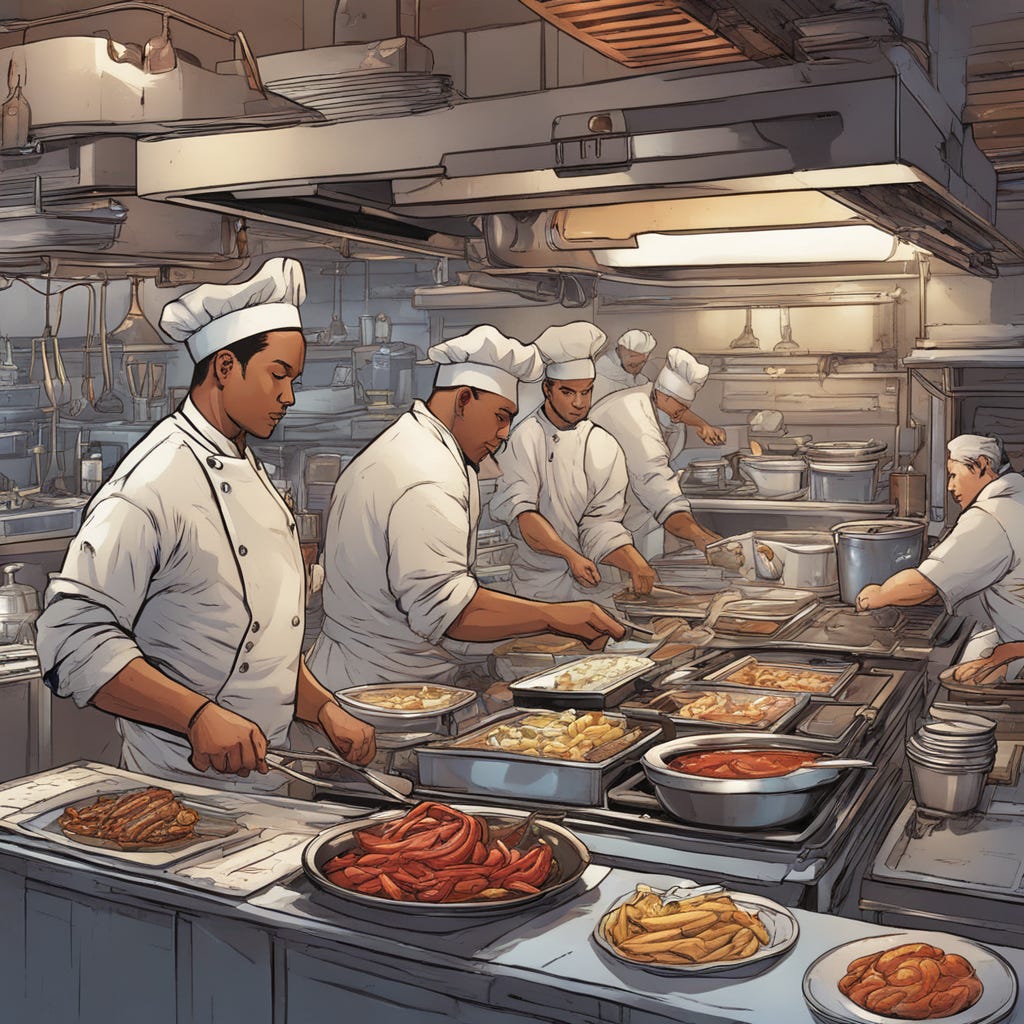On the Fly: Learning the Language of the Kitchen
What the Hell are These Crazy People Talking About?
If you’ve ever eaten in a restaurant with an open kitchen you’ve probably heard some of the noise and chatter being thrown around in the midst of the culinary chaos. To the untrained ear, this can sound like word salad between expletives and safety calls.
It’s true, the kitchen does have its own language, and just like any other brotherhood (kitchen sisters included) that has been bonded by stress and accomplishment, this language only makes sense to the ones that were there.
When I first started in the kitchen as a dishwasher, I heard all kinds of words and phrases that everyone but me seemed to understand. Part of the reason I stuck around so long was that I wanted to know what the hell they were talking about. Let’s find out!
Today we’re going to sound off kitchen style and take a look at some of the language and terminologies that are used in the culinary world and the professional kitchen.
Corner, hot corner, corner in, corner out!
This is probably the most ubiquitous term that is used not only in the BOH (back of house/kitchen staff) but in the FOH (front of house/dining room staff) as well. This term falls into the category of what we refer to as safety calls.
This particular safety call is spoken or yelled when you are about to come around a corner, but how and where would this term be used?
When exiting the kitchen often around a corner it’s “corner out”, when coming into the kitchen it’s “corner in”. If you are “cornering” with a pot of soup it’s, “hot corner” or “corner hot”. This one should be fairly easy to understand even for the kitchen novice, if you’re walking around a corner say “corner” so you don’t run into anybody.
Behind you, hot behind, behind sharp.
You guessed it, all of these kitchen safety calls have to do with letting someone know that you are behind them.
I have to admit this one feels kind of weird the first few hundred times that you say it. However, it is very important in a professional kitchen to let your co-workers know when you are behind them.
Hot behind sounds even weirder to say but it’s necessary when moving behind someone with that pot of soup. Every time I hear “behind sharp” I get a little worried, but the most interesting one of them all, and I only heard this one time was, “behind you with a knife” Yes, it means the same thing as “behind sharp” but it’s much creepier.
86
This is one that I heard a lot, probably more than I should have at one of the first restaurants I worked in. This restaurant had a whiteboard that just said “86” at the top, sometimes the board would say any number of different food items below the “86”.
I would hear the line cooks yell out, “86 rice, 86 mash, 86 prawn cock, (Prawn Cocktail). I came to find out that to “86” something, meant to temporarily take it off the menu until it could be re-stocked or if it was late enough “86” for the night.
Why is the number 86 used instead of 15 or 54? That sounds kinda of good, hey 54 rice pilaf, maybe not.
I have always wondered, why 86? Well, according to legend, a bar called Chumley's at 86 Bedford Street in the West Village of Lower Manhattan was the origin of this term.
Claims have been made that the police would call Chumley's bar during prohibition before making a raid and tell the bartender to "86" his customers, meaning that they should exit out the 86 Bedford Street, but who knows?
All day
I need 8 fries all day! What the hell does that mean? It sounds like I live in crazy town, maybe it’s because the kitchen is crazy town, but seriously, what does that mean?
When the rush comes down and you’re a line cook there’s no time for disorganized chaos. This type of chaos needs to be organized! A bunch of tickets come into the kitchen, often all at once, slam!
When this happens you’re not just cooking one meal at a time, you’re cooking many. So when I say I need 8 fries “all day” I am most likely cooking 8 different meals at the same time, that all include fries. This term is used to tell the station cook how many like items you need for as many meals as are being prepared.
So if the server rings in four tables of 2 or four 2 tops as we call it, and every meal needs fries, I then will need 8 fries all day.
As much of an industry standard as these terms are, every kitchen is different. I am sure that there are some kitchens out there that have a completely different language that I wouldn’t be able to understand without knowing the exact dynamic of their kitchen.
The next time you are sitting in a restaurant where you can hear what’s going on back there, take a listen and you may just be able to better understand how that food gets to your table.







This is a good one.
I also wrote about language today, but I picked on the word "tomorrow." This is a really neat coincidence, and it was fun to read.
Loved this. I was FOH management for a long time and it was crazyville some nights but nothing compared to the kitchen. I was always in awe of the quality of the food that came out despite of the conditions. Kudos to all kitchen staff.